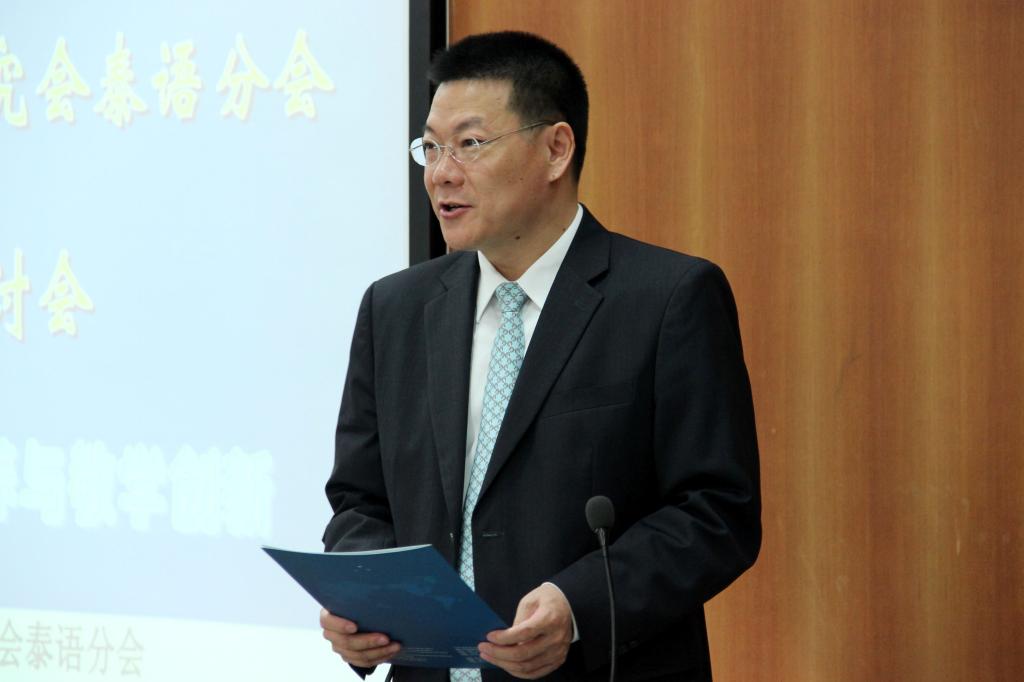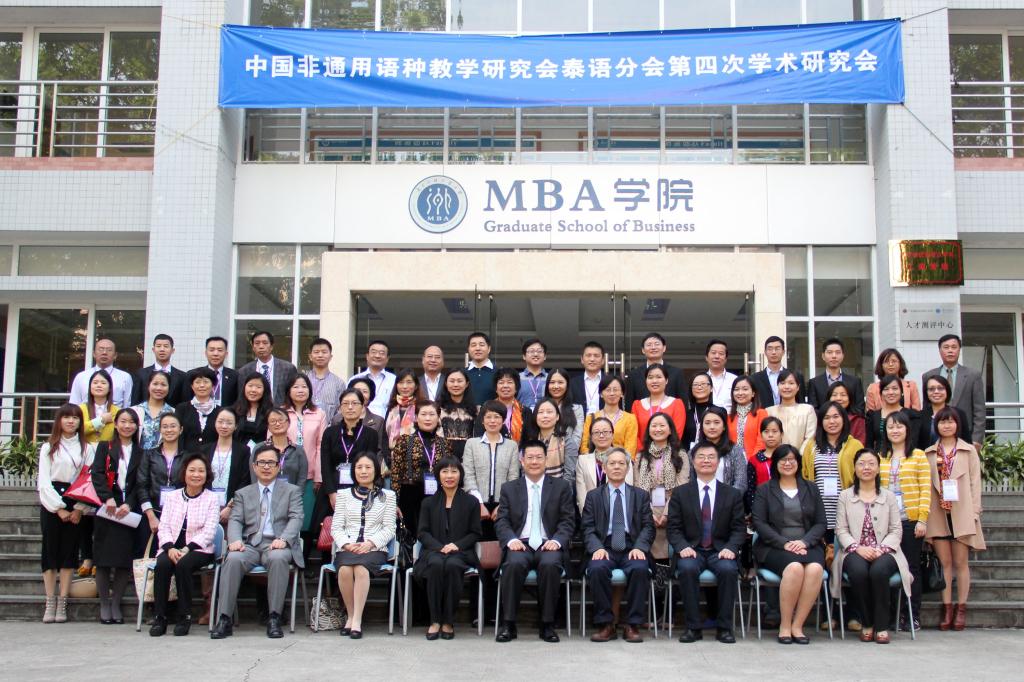On November 16th, the Fourth Academic Conference of the Thai Sub-Association, National Education Association of Less Commonly Taught Languages was held at the GDUFS MBA Center. The topic of this conference focused on the training of talent and innovations in education and research related to Thai in the new circumstances of the globalized world. Supported by the Royal Thai Consulate General in Guangzhou, the World Publishing Guangzhou Corporation-and the 1989 GDUFS Thai Major alumnae association, the conference attracted 60 universities professors from 29 institutions all over the country. This conference not only is a great event for the academic circle of Thai language learning, but also provides a good platform to communicate and promote education and research of the Thai language.
Consul-General Mrs. Suphatra Seemaitreephitak of the Royal Thai Consulate General in Guangzhou, President of GDUFS ZHONG Weihe, Director of the Advisory Committee of Less Commonly Taught Languages (ACLCTL), the National Foreign Language Teaching Advisory Board under the Ministry of Education, LIU Shuxiong, President of the National Education Association of Less Commonly Taught Languages, ZHONG Zhixiang and the Director of the Thai Sub-Association, LIN Xiumei, Director of Faculty of Asian Languages and Culture, GDUFS CHEN Duoyou and Secretary of the Party Committee from Faculty of Asian Language and Culture, AO Xianghui presented remarks at the opening ceremony held in the morning and some made opening addresses.
In his address, President ZHONG Weihe extended a warm welcome to all present and his sincere gratitude to Her Royal Highness, Princess Maha Chakri Sirindhorn, who recently visited GDUFS for the third time, as well as the Royal Thai Consulate General in Guangzhou for their long-lasting supports to GDUFS`s Thai teaching and learning efforts. He also hoped that the conference could inject new energy into the cooperation and exchange programs among the colleges.

President ZHONG Weihe addressing opening speech
Consul-General Mrs.Suphatra Seemaitreephitak reviewed the history of friendly interactions between the Consulate General and GDUFS by mentioning the help and opportunities offered to GDUFS Thai Majors, and that students who benefited, in turn, become the backbone force of the Consulate General. She indicated that as the increasing non-governmental exchanges between the two countries requires more talent in the Thai language; the Consulate General will support all the activities that promote education in the Thai language. She also invited those attending to celebrating the coming Thai Loy Krathong Festival.

Consul-General Mrs.Suphatra Seemaitreephitak speaking
Professor ZHONG Zhixiang from Peking University and Professor LIN Xiumei from GDUFS also presented remarks during the opening ceremony. They reviewed the developmental history of the Thai Language Major in China and, according to them; the first university setting up Thai Major was Peking University in 1946. Then were the People's Liberation Army Foreign Language School in 1959; Guangxi University for Nationalities in 1964; BFSU in 1965 and GDUFS in 1970. To date-there are more than 46 colleges with Thai major which typically ranks the second among majors of less commonly taught languages in China.
The number of currently enrolled students in the major has reached 50,000 with 35,000 of these in Yunnan Province alone. A training system from bachelor to postdoctoral has also been established with different program settings at the different universities. In general, the bachelor programs involve bilingual learning of Thai and English and provide chances to study abroad. Despite all those development, it was commented that key educators in the Thai Major should strengthen their efforts toward improving the structure of the courses to provide number of talents wanted by potential employers.
After the opening ceremony-and during the conference, 7 professors or associate professors made individual presentations.
LIU Shuxiong from Peking University, as Director of ACLCTL, talked about further work pending related to Thai language education in terms of the whole blueprint for less commonly used languages. That is specifically formulating National Quality Standards to assure the needed and qualified talents in the area of less commonly used languages can be provided through specialized education programs. This progress, based on existing achievements in both teaching and research, should focus on setting standards promoting language education instead of limiting it. Additionally, improving the teaching staff and compiling better courses and teaching materials should be primary goals. Too, there are 3 major tasks to be done: (1)The senior workshop for youth teachers in Peking University in 2014, (2) The programs of translation and study of Classic Oriental Literature and (3) The submission of annual reports on the construction and development of majors in the less commonly used languages of our hemisphere.
Other speakers shared insights related to historic reforms, some specific programs, the existing achievements and deficiencies, future projects and resolutions of related to the Thai Major-regarding the quality of education and the training of talent in the colleges where they work.
Later in the afternoon, group discussions on different research projects were conducted followed by the closing ceremony. Through this conference, an overall picture could be seen with the strong points shown, problems examined and advice raised and heard. Thus Thai university language professors present in could deepen their communication and understanding in the training of talent and innovations in Thai language education and research.

Photograph of All Present in the Conference

